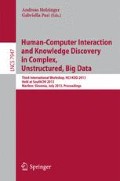Abstract
In this study, a multi-dimensional personalization approach is pro-posed for developing adaptive learning systems by taking various personalized features into account, including learning styles and cognitive styles of student. In this innovative approach, learning materials were categorized into several types and associated as a learning content based on students’ learning styles to provide personalized learning materials and presentation layouts. Furthermore, personalized user interfaces and navigation strategies were developed based on students’ cognitive styles. To evaluate the performance of the proposed approach, an experiment was conducted on the learning activity on the learning activity of the "Computer Networks" course of a college in Taiwan. The experimental results showed that the students who learned with the system developed with the proposed approach revealed significantly better learning achievements than the students who learn with conventional adaptive learning system, showing that the proposed is effective and promising.
Access this chapter
Tax calculation will be finalised at checkout
Purchases are for personal use only
Preview
Unable to display preview. Download preview PDF.
References
Mampadi, F., Chen, S.Y.H., Ghinea, G., Chen, M.P.: Design of adaptive hypermedia learning systems: A cognitive style approach. Computers & Education 56(4), 1003–1011 (2011)
Nielsen, L., Heffernan, C., Lin, Y., Yu, J.: The Daktari: An interactive, multi-media tool for knowledge transfer among poor livestock keepers in Kenya. Computers & Education 54, 1241–1247 (2010)
Tseng, J.C.R., Chu, H.C., Hwang, G.J., Tsai, C.C.: Development of an adaptive learning system with two sources of personalization information. Computers & Education 51(2), 776–786 (2008)
Papanikolaou, K.A., Grigoriadou, M., Magoulas, G.D., Kornilakis, H.: Towards new forms of knowledge communication: the adaptive dimension of a web-based learning environment. Computers & Education 39, 333–360 (2002)
Hsieh, S.W., Jang, Y.R., Hwang, G.J., Chen, N.S.: Effects of teaching and learning styles on students’ reflection levels for ubiquitous learning. Computers & Education 57(1), 1194–1201 (2011)
Hwang, G.J., Tsai, P.S., Tsai, C.C., Tseng, J.C.R.: A novel approach for assisting teachers in analyzing student web-searching behaviors. Computers & Education 51(2), 926–938 (2008)
Filippidis, S.K., Tsoukalas, L.A.: On the use of adaptive instructional images based on the sequential-global dimension of the Felder-Silverman learning style theory. Interactive Learning Environments 17(2), 135–150 (2009)
Keefe, J.W.: Learning style: Cognitive and thinking skills. National Association of Secondary School Principals, Reston (1991)
Felder, R.M., Silverman, L.K.: Learning styles and teaching styles in engineering education. Engineering Education 78, 674–681 (1988)
Kuljis, J., Liu, F.: A comparison of learning style theories on the suitability for elearning. In: Hamza, M.H. (ed.) Proceedings of the IASTED Conference on Web-Technologies, Applications, and Services, pp. 191–197. ACTA Press (2005)
Witkin, H.A., Moore, C.A., Goodenough, D.R., Cox, P.W.: Field-dependent and field-independent cognitive styles and their educational implications. Review of Educational Research 47(1), 1–64 (1977)
van Seters, J.R., Ossevoort, M.A., Tramper, J., Goedhart, M.J.: The influence of student characteristics on the use of adaptive e-learning material. Computers & Education 58, 942–952 (2012)
Hwang, G.J., Yin, P.Y., Wang, T.T., Tseng, J.C.R., Hwang, G.H.: An enhanced genetic approach to optimizing auto-reply accuracy of an e-learning system. Computers & Education 51(1), 337–353 (2008)
Author information
Authors and Affiliations
Editor information
Editors and Affiliations
Rights and permissions
Copyright information
© 2013 Springer-Verlag Berlin Heidelberg
About this paper
Cite this paper
Yang, TC., Hwang, GJ., Chiang, T.H.C., Yang, S.J.H. (2013). A Multi-dimensional Personalization Approach to Developing Adaptive Learning Systems. In: Holzinger, A., Pasi, G. (eds) Human-Computer Interaction and Knowledge Discovery in Complex, Unstructured, Big Data. HCI-KDD 2013. Lecture Notes in Computer Science, vol 7947. Springer, Berlin, Heidelberg. https://doi.org/10.1007/978-3-642-39146-0_30
Download citation
DOI: https://doi.org/10.1007/978-3-642-39146-0_30
Publisher Name: Springer, Berlin, Heidelberg
Print ISBN: 978-3-642-39145-3
Online ISBN: 978-3-642-39146-0
eBook Packages: Computer ScienceComputer Science (R0)

